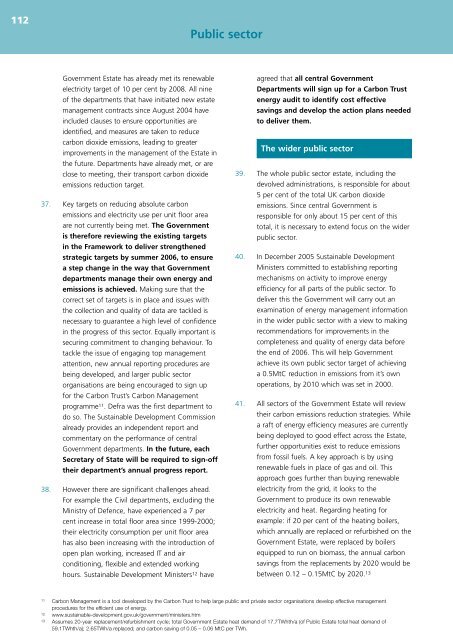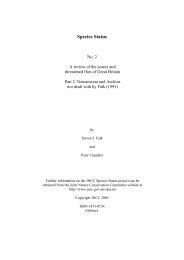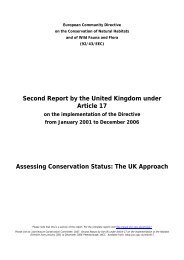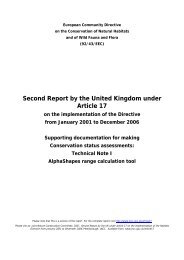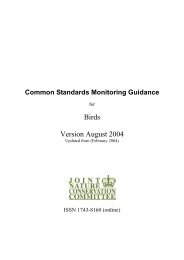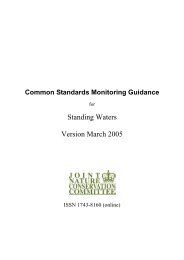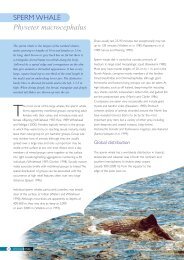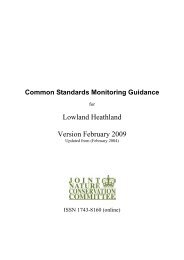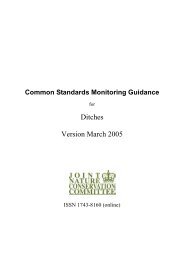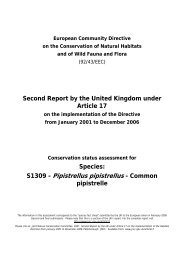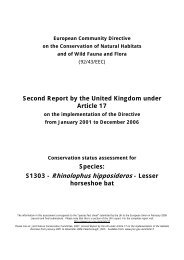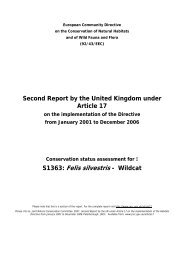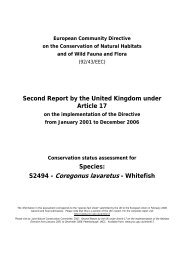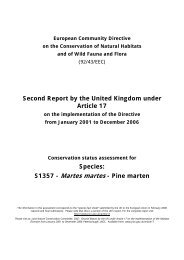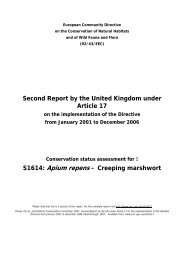UK Climate Change Programme 2006 - JNCC - Defra
UK Climate Change Programme 2006 - JNCC - Defra
UK Climate Change Programme 2006 - JNCC - Defra
Create successful ePaper yourself
Turn your PDF publications into a flip-book with our unique Google optimized e-Paper software.
112<br />
Public sector<br />
Government Estate has already met its renewable<br />
electricity target of 10 per cent by 2008. All nine<br />
of the departments that have initiated new estate<br />
management contracts since August 2004 have<br />
included clauses to ensure opportunities are<br />
identified, and measures are taken to reduce<br />
carbon dioxide emissions, leading to greater<br />
improvements in the management of the Estate in<br />
the future. Departments have already met, or are<br />
close to meeting, their transport carbon dioxide<br />
emissions reduction target.<br />
37. Key targets on reducing absolute carbon<br />
emissions and electricity use per unit floor area<br />
are not currently being met. The Government<br />
is therefore reviewing the existing targets<br />
in the Framework to deliver strengthened<br />
strategic targets by summer <strong>2006</strong>, to ensure<br />
a step change in the way that Government<br />
departments manage their own energy and<br />
emissions is achieved. Making sure that the<br />
correct set of targets is in place and issues with<br />
the collection and quality of data are tackled is<br />
necessary to guarantee a high level of confidence<br />
in the progress of this sector. Equally important is<br />
securing commitment to changing behaviour. To<br />
tackle the issue of engaging top management<br />
attention, new annual reporting procedures are<br />
being developed, and larger public sector<br />
organisations are being encouraged to sign up<br />
for the Carbon Trust’s Carbon Management<br />
programme 11 . <strong>Defra</strong> was the first department to<br />
do so. The Sustainable Development Commission<br />
already provides an independent report and<br />
commentary on the performance of central<br />
Government departments. In the future, each<br />
Secretary of State will be required to sign-off<br />
their department’s annual progress report.<br />
38. However there are significant challenges ahead.<br />
For example the Civil departments, excluding the<br />
Ministry of Defence, have experienced a 7 per<br />
cent increase in total floor area since 1999-2000;<br />
their electricity consumption per unit floor area<br />
has also been increasing with the introduction of<br />
open plan working, increased IT and air<br />
conditioning, flexible and extended working<br />
hours. Sustainable Development Ministers 12 have<br />
agreed that all central Government<br />
Departments will sign up for a Carbon Trust<br />
energy audit to identify cost effective<br />
savings and develop the action plans needed<br />
to deliver them.<br />
The wider public sector<br />
39. The whole public sector estate, including the<br />
devolved administrations, is responsible for about<br />
5 per cent of the total <strong>UK</strong> carbon dioxide<br />
emissions. Since central Government is<br />
responsible for only about 15 per cent of this<br />
total, it is necessary to extend focus on the wider<br />
public sector.<br />
40. In December 2005 Sustainable Development<br />
Ministers committed to establishing reporting<br />
mechanisms on activity to improve energy<br />
efficiency for all parts of the public sector. To<br />
deliver this the Government will carry out an<br />
examination of energy management information<br />
in the wider public sector with a view to making<br />
recommendations for improvements in the<br />
completeness and quality of energy data before<br />
the end of <strong>2006</strong>. This will help Government<br />
achieve its own public sector target of achieving<br />
a 0.5MtC reduction in emissions from it’s own<br />
operations, by 2010 which was set in 2000.<br />
41. All sectors of the Government Estate will review<br />
their carbon emissions reduction strategies. While<br />
a raft of energy efficiency measures are currently<br />
being deployed to good effect across the Estate,<br />
further opportunities exist to reduce emissions<br />
from fossil fuels. A key approach is by using<br />
renewable fuels in place of gas and oil. This<br />
approach goes further than buying renewable<br />
electricity from the grid, it looks to the<br />
Government to produce its own renewable<br />
electricity and heat. Regarding heating for<br />
example: if 20 per cent of the heating boilers,<br />
which annually are replaced or refurbished on the<br />
Government Estate, were replaced by boilers<br />
equipped to run on biomass, the annual carbon<br />
savings from the replacements by 2020 would be<br />
between 0.12 – 0.15MtC by 2020. 13<br />
11 Carbon Management is a tool developed by the Carbon Trust to help large public and private sector organisations develop effective management<br />
procedures for the efficient use of energy.<br />
12 www.sustainable-development.gov.uk/government/ministers.htm<br />
13 Assumes 20-year replacement/refurbishment cycle; total Government Estate heat demand of 17.7TWhth/a (of Public Estate total heat demand of<br />
59.1TWhth/a); 2.65TWh/a replaced; and carbon saving of 0.05 – 0.06 MtC per TWh.


